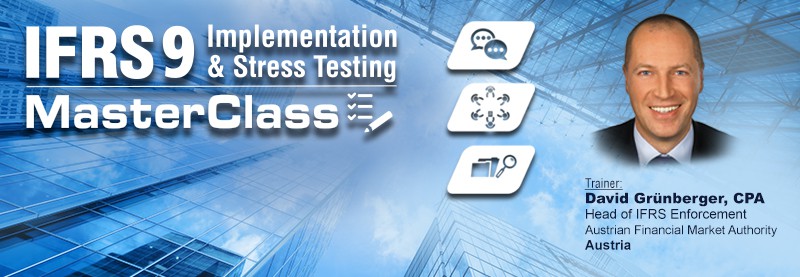IFRS 9 Implementation and Stress Testing MasterClass was designed to improve the level of knowledge in the field of
IFRS 9 which comes into effect on the 01 January 2018, meaning: it is crucial to get up to speed with the new regulations.
The MasterClass approach is vastly practical. It will help you to understand fundamental concepts and principles
underlying IFRS9 and also develop your skills in its efficient implementation in every aspect. One of the reasons why
GLC MasterClasses stand out from others is that our participants gain not only the knowledge from highly experienced
and specialized professionals, but also learn how to apply the gained insights in real life.
IFRS 9 Implementation and Stress Testing MasterClass is essential for professionals in the field of accounting, auditing and finance, who are aiming for career development. The MasterClass will cover new regulatory topics, especially the Credit Risk Stress test, beside basic ethics.
Special features:
- Best practices
- Regulatory insight
- Case studies
- Templates and Step-by-step guides
Training includes:
- Specific and exceptional educational insights combining modern theories and practical examples
- Workshop using advanced international experience and knowledge of high-level expert
- Special materials and templates for future use by the participants in their work
Some of the key takeaways include:
- Learn how to interpret accounting requirements of IFRS 9 into a model context
- Find out how to align International Accounting Standards and EBA Requirements on EL-Provisions
- Run EBA-Stress Test on IFRS 9 data
- Combine EBA Baseline and Adverse Scenarios with IFRS 9 models
- Integrate Stress Test Foresight and Migration Methodologies
- Run SICR in a Stresstest Framework
- Observe SSM Guidance on NPL Valuation and Management
- Establish issues and solutions of 12 month and lifetime PD measurement
- Understand Steering Profits and Risks based on IFRS 9 and Integration of Stress Tests
- Unveil EBA- and ECB-Impact Assessments with overview on current Supervisory Responses to IFRS 9
- Become aware of critical issues to be solved with IFRS 9 in defaults, NPLs and Stage 3
- Uncover Best Practice from the Supervisory Discussions with European Banks
- Determine Regulatory Capital: CRR and IFRS 9
- Determine the Basel and EBA Guidelines on ECL and current ECB developments
- Identify how to combine the hedge accounting model and 3 Stage Provisions in IFRS 9
The Trainer:
 Dr. David Grünberger, CPA heads the financial reporting enforcement unit at the Austrian Financial Market Authority.
Dr. David Grünberger, CPA heads the financial reporting enforcement unit at the Austrian Financial Market Authority.
His team examines the financial reports of exchange listed groups for accounting errors. He also deals with prudential accounting issues of banks, aiming at the integration of IFRS and the CRR. He participates in the IFRS 9 working groups of ESMA, EBA, the European Central Bank and the European Systemic Risk Board and heads the national IFRS 9 implementation in the Austrian FMA. David published several books and over 70 journal articles on IFRS and credit risk valuation and lectures IFRS at two universities.



